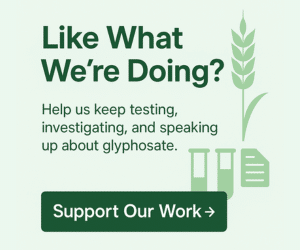Bayer says glyphosate is safe. Regulators say it’s safe. So why does the company keep shelling out billions to settle lawsuits?
If the science is on their side, why not just fight every case and prove it once and for all?
There’s a strategy at play here — one that has less to do with science and more to do with controlling the narrative. Bayer’s approach to the Roundup lawsuits is a masterclass in corporate damage control — but what does it really tell us about the company’s confidence in glyphosate’s safety?
Fighting Every Case Is Too Risky
Bayer inherited Monsanto’s legal baggage when it acquired the company in 2018. At that point, thousands of lawsuits were already in motion, alleging that glyphosate — the active ingredient in Roundup — caused non-Hodgkin lymphoma.
If Bayer truly believes glyphosate is safe, why settle at all? The answer lies in the numbers. Fighting every single lawsuit would not only be astronomically expensive but also risky. Losing even a fraction of the cases could set a precedent that would snowball into even bigger payouts.
Imagine the headlines if a court found Roundup conclusively responsible for cancer — it would trigger a flood of new claims and potentially lead to bans or severe restrictions worldwide. By settling, Bayer avoids the risk of a single, devastating verdict.
Protecting the Brand — At All Costs
Glyphosate isn’t just any herbicide. It’s the cornerstone of Bayer’s agricultural business. Farmers around the world rely on Roundup and glyphosate-resistant crops to maintain high yields. If the perception shifts from “effective weed killer” to “dangerous carcinogen,” it’s not just lawsuits at stake — it’s the entire business model.
By settling lawsuits without admitting wrongdoing, Bayer avoids a prolonged public dispute. It’s a way to resolve the issue quietly and systematically, minimizing media attention. Settling also keeps many details out of the public eye, avoiding the release of potentially damaging internal documents. It’s damage control, plain and simple.
Settlements Without Admission of Guilt
It’s a clever move: settle without admitting wrongdoing. That way, Bayer can continue to assert that glyphosate is safe while neutralizing the immediate threat of a courtroom loss. Critics argue that if Bayer were truly confident in glyphosate’s safety, it would fight to clear its name. But settling allows the company to keep selling Roundup without the shadow of a high-profile trial.
A Strategy to Outlast the Backlash
Some observers suggest that Bayer’s strategy may be to weather the current controversy, hoping that public attention will eventually fade. Quiet settlements reduce the risk of media scrutiny, allowing the company to maintain its narrative.
Meanwhile, Bayer continues its PR push to reassure farmers and regulators that glyphosate is indispensable. With global food security as a talking point, Bayer frames the debate as a choice between modern agriculture and outdated fears.
The Real Risk: Public Perception
Ultimately, Bayer isn’t just defending glyphosate. It’s defending the entire agrochemical industry. If Roundup goes down, it could take other herbicides with it, creating a domino effect. By choosing to settle, Bayer protects not just its product but the broader acceptance of chemical-dependent agriculture.
But what if the evidence continues to mount? What if more studies point to health risks? At what point does settling become an admission in itself — a tacit acknowledgment that fighting isn’t worth the risk?
The Bottom Line
Settling lawsuits while insisting on glyphosate’s safety is a strategic contradiction. Bayer wants the legal battles to fade without conceding that Roundup might be harmful. It’s a balancing act between corporate survival and public accountability.
The real question is, how long can Bayer keep paying to maintain this narrative? And at what point does the cost — financial, reputational, and ethical — become too high?
Maybe the bigger issue isn’t just why Bayer keeps settling. It’s why we keep accepting these settlements as a resolution instead of demanding a transparent, conclusive answer about glyphosate’s safety.
Final Thought
Bayer’s ongoing strategy of settling Roundup lawsuits while insisting on glyphosate’s safety is a strategic contradiction. On one hand, it’s a calculated move to minimize financial risk and avoid damaging court rulings. On the other, it raises questions about confidence in the product’s safety.
If Bayer truly believed in glyphosate’s harmlessness, wouldn’t it make more sense to fight every case and clear its name once and for all? Instead, the company seems more focused on managing reputation and containing the fallout.
But how long can this strategy hold? At what point do settlements stop being seen as smart damage control and start appearing as quiet admissions of doubt?
Perhaps the real issue isn’t just why Bayer keeps settling. It’s why we keep accepting these settlements as the final word instead of demanding a transparent, conclusive answer about glyphosate’s safety.
To understand how Bayer’s settlement strategy may actually be a tactic to suppress public awareness, read our follow-up piece: Settling to Silence: Why Bayer Prefers Deals.
When a company repeatedly settles while maintaining its product’s safety, it raises a crucial question: Is it damage control or a quiet admission of risk?
Resources and References
Understanding why Bayer continues to settle Roundup lawsuits requires a look at both the legal landscape and the underlying health concerns. The following resources provide valuable insights into the ongoing legal challenges, the scientific classification of glyphosate, and the real-world impact of lawsuits.
This list represents just a few of the many available reports and studies on the topic. There’s much more out there if you dig deeper — these are just some of the key pieces to help you get started.
Bayer ordered to pay $2.25 billion in latest Roundup trial – Reuters
This news report details a significant legal loss for Bayer, where a Pennsylvania jury ordered the company to pay $2.25 billion to a man who developed cancer after using Roundup. The case highlights why Bayer often chooses to settle rather than face unpredictable courtroom verdicts.
Link: Bayer ordered to pay $2.25 billion in latest Roundup trial
Popular weedkiller Roundup on trial again as cancer victims demand justice – The Guardian
This article explores why Bayer’s legal troubles continue despite previous settlements. It provides context on the persistence of lawsuits, driven by cancer victims seeking accountability for the herbicide’s potential health risks.
Link: The Guardian Roundup Lawsuits
IARC Monograph on Glyphosate – International Agency for Research on Cancer (IARC)
This authoritative report from the IARC classifies glyphosate as “probably carcinogenic to humans.” The classification has been a major factor in the wave of lawsuits against Bayer, as plaintiffs argue that Roundup exposure contributed to their cancer diagnoses.
Link: IARC Monograph on Glyphosate
These resources offer insight into both the legal risks Bayer faces and the scientific controversies fueling the ongoing litigation. As new cases arise, understanding the broader context behind these settlements is essential.
Image Source & Attribution
We’re grateful to the talented photographers and designers whose work enhances our content. The feature image on this page is by thecorgi. You can find more of their work here: https://www.123rf.com/profile_thecorgi.




